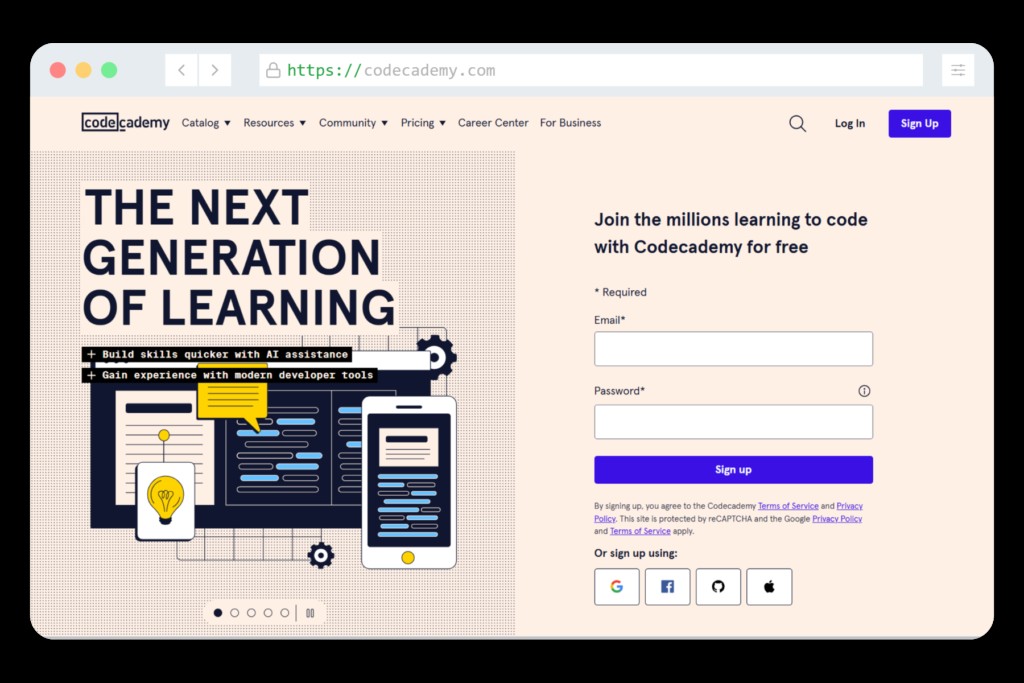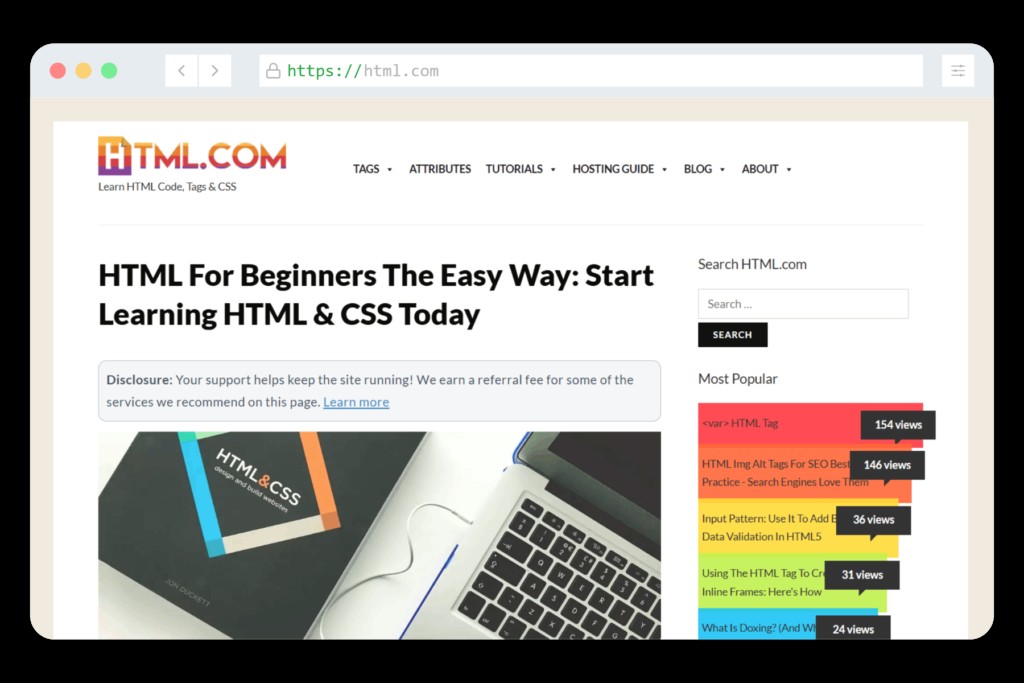Learning how to code for free is entirely possible and opens doors to exciting career opportunities and personal projects. At LEARNS.EDU.VN, we believe everyone should have access to quality education, so we’ve compiled the ultimate guide to help you begin your coding journey without spending a dime. Discover resources, tips, and strategies to gain essential skills in programming, web development, and more. Embrace accessible learning, career advancement, and skill development with LEARNS.EDU.VN.
1. Understanding the Landscape of Free Coding Resources
The digital world offers a plethora of free resources to learn code, but navigating them can feel overwhelming. Let’s explore the different types of free coding resources available, weighing their pros and cons to help you make informed decisions.
| Resource Type | Description | Pros | Cons |
|---|---|---|---|
| Interactive Coding Platforms | Websites offering hands-on coding exercises and projects directly in your browser. | Immediate feedback, engaging learning experience, covers various programming languages. | Limited depth in some topics, may require a paid subscription for advanced content. |
| Online Courses (MOOCs) | Massive Open Online Courses from universities and educational institutions, often offering free audit options. | Structured learning, high-quality content, taught by experts. | Limited interaction without paid enrollment, may lack hands-on projects. |
| Documentation and Tutorials | Official documentation and tutorials provided by programming language developers or communities. | Comprehensive information, accurate and up-to-date, essential for reference. | Can be overwhelming for beginners, may lack practical examples. |
| Coding Communities and Forums | Online communities where you can ask questions, share code, and collaborate with other learners and experienced developers. | Peer support, problem-solving assistance, networking opportunities. | Information can be inconsistent, requires critical evaluation, may be time-consuming to find relevant answers. |
| Open-Source Projects | Opportunities to contribute to real-world software projects, gaining practical experience and building your portfolio. | Practical experience, portfolio building, collaboration with experienced developers. | Requires existing coding knowledge, can be challenging to contribute effectively at the beginning. |
| YouTube Tutorials | Video tutorials covering various coding topics, often created by individual developers or educational channels. | Visual learning, diverse range of topics, easy to follow along. | Quality varies, may lack structured learning paths, information can be outdated. |


2. Defining Your Learning Goals
Before diving into the sea of free coding resources, it’s essential to define your learning goals. Having a clear understanding of what you want to achieve will help you stay focused and motivated throughout your coding journey.
2.1 Identifying Your Interests
Start by identifying your interests and passions. What kind of projects do you envision yourself building? Are you interested in web development, mobile app development, data science, or something else?
- Web Development: Building websites and web applications using HTML, CSS, and JavaScript.
- Mobile App Development: Creating applications for iOS and Android devices using languages like Swift and Java/Kotlin.
- Data Science: Analyzing and interpreting data using Python and statistical methods.
- Game Development: Designing and developing video games using languages like C# and C++.
2.2 Setting Specific, Measurable, Achievable, Relevant, and Time-Bound (SMART) Goals
Once you’ve identified your interests, set specific, measurable, achievable, relevant, and time-bound (SMART) goals. For example:
- Specific: Learn the basics of HTML and CSS.
- Measurable: Complete the first five modules of a free HTML and CSS course on Codecademy.
- Achievable: Dedicate 1-2 hours per day to coding.
- Relevant: Web development skills are in high demand and align with my career goals.
- Time-Bound: Complete the course within two weeks.
2.3 Breaking Down Larger Goals into Smaller Tasks
Break down larger goals into smaller, more manageable tasks. This will make the learning process less daunting and help you track your progress. For example, if your goal is to build a simple website, break it down into the following tasks:
- Learn HTML basics.
- Learn CSS basics.
- Create the website structure using HTML.
- Style the website using CSS.
- Deploy the website to a free hosting platform.
3. Top Platforms to Learn Coding for Free
3.1 Interactive Coding Platforms
These platforms provide interactive exercises and projects, allowing you to write and run code directly in your browser.
- Codecademy: Offers free courses in various programming languages, including HTML, CSS, JavaScript, Python, and Java. (Visit Codecademy)
- freeCodeCamp: A non-profit organization offering free coding classes and certifications in web development, data visualization, machine learning, and more. (Visit freeCodeCamp)
- Khan Academy: Provides free educational resources, including coding courses for beginners, covering topics like HTML, CSS, JavaScript, and SQL. (Visit Khan Academy)
- Codewars: Offers coding challenges (“katas”) with a martial arts theme, allowing you to practice your skills and earn rank as you progress. (Visit Codewars)
- General Assembly Dash: A free platform teaching the basics of HTML, CSS, and JavaScript through interactive projects. (Visit General Assembly Dash)
3.2 Online Courses (MOOCs)
These platforms host courses from top universities and educational institutions, often offering free audit options.
- Coursera: Offers courses from universities like Stanford and Yale, with free audit options for many coding classes. (Visit Coursera)
- edX: Provides courses from universities like Harvard and MIT, with free audit options for classes on programming languages and web development. (Visit EdX)
- MIT OpenCourseWare: Publishes all educational materials from MIT courses online for free, including introductory programming courses. (Visit MIT OpenCourseWare)
- Udemy: Hosts a marketplace of user-created courses, with many free coding classes available, including introductory courses for beginners. (Visit Udemy)
- Udacity: Offers a mix of free and paid classes, with free “nanodegrees” covering topics like HTML, CSS, and Python programming. (Visit Udacity)
3.3 Documentation and Tutorials
These resources provide comprehensive information and tutorials on various programming languages and technologies.
- MDN Web Docs: A comprehensive resource for web developers, offering tutorials, documentation, and examples for HTML, CSS, and JavaScript. (Visit MDN Web Docs)
- w3schools: A free online learning platform dedicated to coding and web development, offering tutorials and examples for HTML, CSS, JavaScript, SQL, and more. (Visit w3schools)
- HTML.com: A free resource offering HTML tutorials for absolute beginners, covering the basics of HTML and web development. (Visit HTML.com)
- Learn-HTML.org: An online resource offering step-by-step tutorials and interactive exercises focused on teaching HTML for beginners. (Visit Learn-HTML.org)
- HTML Dog: Hosts free HTML tutorials, along with examples of HTML, CSS, and JavaScript at work. (Visit HTML Dog)
3.4 Coding Communities and Forums
These online communities provide peer support, problem-solving assistance, and networking opportunities.
- Stack Overflow: A question-and-answer website for programmers, where you can ask questions, share code, and find solutions to coding problems. (Visit Stack Overflow)
- Reddit: Subreddits like r/learnprogramming and r/programming offer a space to ask questions, share resources, and connect with other learners. (Visit Reddit)
- GitHub: A platform for hosting and collaborating on code, where you can find open-source projects to contribute to and connect with other developers. (Visit GitHub)
- Dev.to: A community of software developers sharing articles, tutorials, and discussions on various coding topics. (Visit Dev.to)
- Hashnode: A blogging platform for developers, where you can share your knowledge, learn from others, and connect with the community. (Visit Hashnode)
3.5 YouTube Channels
YouTube offers a vast library of video tutorials covering various coding topics.
| Channel Name | Description |
|---|---|
| Traversy Media | Covers web development topics, including HTML, CSS, JavaScript, and various frameworks. |
| The Net Ninja | Offers tutorials on web development, JavaScript, Node.js, and other technologies. |
| freeCodeCamp.org | Features tutorials and courses on web development, data science, and machine learning. |
| Programming with Mosh | Provides tutorials on various programming languages, including C#, Python, and JavaScript. |
| Academind | Covers web development topics, including React, Angular, and Vue.js. |
4. Essential Coding Languages to Learn for Free
4.1 HTML (HyperText Markup Language)
HTML is the foundation of the web, used to create the structure and content of web pages.
- Resources: Codecademy, freeCodeCamp, Khan Academy, MDN Web Docs, w3schools, HTML.com, Learn-HTML.org, HTML Dog
4.2 CSS (Cascading Style Sheets)
CSS is used to style and format the appearance of web pages, controlling the layout, colors, fonts, and other visual aspects.
- Resources: Codecademy, freeCodeCamp, Khan Academy, MDN Web Docs, w3schools
4.3 JavaScript
JavaScript is a versatile programming language used to add interactivity and dynamic behavior to web pages.
- Resources: Codecademy, freeCodeCamp, Khan Academy, MDN Web Docs, w3schools, Learn-JS.org, JavaScript.com, JavaScript for Cats
4.4 Python
Python is a popular programming language used for data science, machine learning, web development, and more.
- Resources: Codecademy, freeCodeCamp, Khan Academy, Learnpython.org, Python-Guide.Org, Real Python
4.5 Java
Java is a widely used programming language for building enterprise applications, Android apps, and more.
- Resources: Codecademy, freeCodeCamp, Khan Academy, MIT OpenCourseWare
5. Creating a Structured Learning Plan
A structured learning plan is essential for staying organized and making consistent progress.
5.1 Choosing a Learning Path
Select a learning path that aligns with your interests and goals. For example, if you’re interested in web development, you might choose a path that covers HTML, CSS, and JavaScript.
5.2 Setting a Schedule
Set a realistic schedule that you can stick to consistently. Aim for at least 1-2 hours of coding per day.
5.3 Tracking Your Progress
Track your progress to stay motivated and identify areas where you need to improve. Use a notebook, spreadsheet, or project management tool to track your learning goals and accomplishments.
5.4 Incorporating Hands-On Projects
Incorporate hands-on projects into your learning plan to apply your knowledge and build your portfolio. Start with small projects and gradually increase the complexity as you progress.
6. Tips for Staying Motivated and Overcoming Challenges
6.1 Find a Coding Buddy
Having a coding buddy can provide support, motivation, and accountability.
6.2 Join a Coding Community
Joining a coding community can help you connect with other learners, ask questions, and share your progress.
6.3 Celebrate Your Successes
Celebrate your successes, no matter how small. This will help you stay motivated and build confidence.
6.4 Don’t Be Afraid to Ask for Help
Don’t be afraid to ask for help when you’re stuck. The coding community is generally very supportive and willing to assist.
6.5 Take Breaks
Take breaks to avoid burnout and stay refreshed. Step away from the computer and do something you enjoy.
7. Building Your Portfolio
A portfolio is essential for showcasing your skills and attracting potential employers.
7.1 Creating Projects
Create projects that demonstrate your skills and interests. These projects can be anything from simple websites to complex applications.
7.2 Contributing to Open Source
Contributing to open-source projects is a great way to gain practical experience and build your portfolio.
7.3 Showcasing Your Work Online
Showcase your work online using platforms like GitHub, GitLab, and personal websites.
7.4 Documenting Your Projects
Document your projects to explain your thought process and the technologies you used.
8. Leveraging LEARNS.EDU.VN for Enhanced Learning
At LEARNS.EDU.VN, we are committed to providing high-quality educational resources to help you achieve your learning goals. Here’s how you can leverage our platform to enhance your coding journey:
8.1 Exploring Our Comprehensive Guides
We offer comprehensive guides on various coding topics, providing in-depth explanations and practical examples.
8.2 Accessing Expert-Led Tutorials
Our expert-led tutorials cover a wide range of coding languages and technologies, providing step-by-step instructions and guidance.
8.3 Participating in Interactive Workshops
Join our interactive workshops to gain hands-on experience and collaborate with other learners.
8.4 Connecting with Our Community
Connect with our community of learners and experts to ask questions, share your progress, and get support.
9. Advanced Learning and Specialization
Once you have a solid foundation in coding, you can explore advanced learning and specialization options.
9.1 Choosing a Specialization
Choose a specialization that aligns with your interests and career goals. Options include web development, mobile app development, data science, machine learning, and more.
9.2 Taking Advanced Courses
Take advanced courses on platforms like Coursera, edX, and Udacity to deepen your knowledge and skills.
9.3 Obtaining Certifications
Obtain certifications from reputable organizations to validate your skills and enhance your resume.
9.4 Attending Conferences and Workshops
Attend conferences and workshops to learn from industry experts and network with other professionals.
10. Career Opportunities and Job Search Strategies
Learning to code can open doors to exciting career opportunities in various industries.
10.1 Identifying Potential Career Paths
Identify potential career paths based on your skills and interests. Options include web developer, mobile app developer, data scientist, software engineer, and more.
10.2 Building Your Resume
Build your resume to highlight your skills, experience, and projects.
10.3 Networking
Network with other professionals in your field to learn about job opportunities and make connections.
10.4 Preparing for Interviews
Prepare for interviews by practicing common coding questions and showcasing your problem-solving skills.
10.5 Utilizing Job Boards and Online Resources
Utilize job boards and online resources to find job openings and apply for positions.
FAQ: Your Questions Answered About Learning Code for Free
| Question | Answer |
|---|---|
| Is it really possible to learn code for free? | Absolutely! Numerous online resources, interactive platforms, and communities offer high-quality coding education without any cost. It requires dedication, discipline, and strategic use of available tools. |
| Which coding language should I learn first? | It depends on your interests. For web development, start with HTML, CSS, and JavaScript. For data science, Python is a great choice. Consider your goals and the type of projects you want to build. |
| How much time do I need to dedicate to learning code? | Consistency is key. Aim for at least 1-2 hours of coding per day. The more time you invest, the faster you’ll progress. |
| What if I get stuck and can’t solve a coding problem? | Don’t be afraid to ask for help. Join coding communities, forums, and online groups. Utilize resources like Stack Overflow and Reddit. Remember, even experienced developers face challenges and seek assistance. |
| How can I build a coding portfolio without paid projects? | Create personal projects, contribute to open-source projects, and participate in coding challenges. Showcase your work on platforms like GitHub and GitLab. Document your projects to explain your thought process and the technologies you used. |
| Do I need a computer science degree to get a coding job? | While a computer science degree can be beneficial, it’s not always necessary. Many employers value skills, experience, and a strong portfolio over formal education. Focus on building your skills and showcasing your work. |
| What are the best free resources for learning code? | Some of the best free resources include Codecademy, freeCodeCamp, Khan Academy, MDN Web Docs, w3schools, Coursera (audit option), edX (audit option), and YouTube channels like Traversy Media and The Net Ninja. |
| How can LEARNS.EDU.VN help me learn code? | LEARNS.EDU.VN offers comprehensive guides, expert-led tutorials, interactive workshops, and a supportive community to help you learn code effectively. We provide structured learning paths and practical examples to enhance your coding journey. |
| What if I lose motivation during the learning process? | Find a coding buddy, join a coding community, celebrate your successes, and take breaks to avoid burnout. Remember why you started learning to code and focus on the long-term benefits. |
| How do I stay up-to-date with the latest coding trends? | Follow industry blogs, attend conferences and workshops, and participate in online communities. Continuously learn and adapt to new technologies and trends in the coding world. |
Conclusion: Your Coding Journey Starts Now
Learning how to code for free is an achievable goal with the right resources, strategies, and mindset. By defining your learning goals, choosing the right platforms, creating a structured learning plan, and staying motivated, you can gain valuable skills and open doors to exciting career opportunities. Remember to leverage LEARNS.EDU.VN for comprehensive guides, expert-led tutorials, and a supportive community.
Ready to start your coding journey? Visit LEARNS.EDU.VN today to explore our resources and discover the endless possibilities of coding!
Contact us:
- Address: 123 Education Way, Learnville, CA 90210, United States
- WhatsApp: +1 555-555-1212
- Website: learns.edu.vn
Take the leap and transform your future with the power of coding. We’re here to support you every step of the way. Happy coding.
